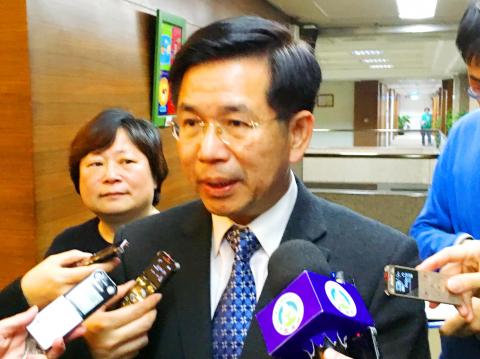At least 30 percent of the nation’s universities have signed letters of agreement with Chinese institutions promising not to include politically sensitive topics in courses offered to Chinese students, Deputy Minister of Education Yao Leeh-ter (姚立德) told lawmakers yesterday.
Yao’s statement left Minister of Education Pan Wen-chung (潘文忠) scrambling to clarify that the ministry has yet to finish its investigation and provide a definitive figure.
Yao was answering a question from Chinese Nationalist Party (KMT) Legislator Lee Yan-hsiu (李彥秀) at a meeting of the legislature’s Social Welfare and Environmental Hygiene Committee.

Photo: Lin Hsiao-yun, Taipei Times
“Although the results of the ministry’s probe have not yet been released, based on my understanding, more than 30 percent of universities have signed such an agreement, but National Taipei University of Technology is not one of them,” Yao said.
Yao is a former president of National Taipei University of Technology. He assumed the post of deputy minister on Monday.
The incident stemmed from leaked documents from Shih Hsin University on Thursday last week, which showed that the university promised that politically sensitive topics, such as “one China, one Taiwan,” “two Chinas” and Taiwanese independence, would not be covered in courses offered to Chinese students.
Lee asked Yao whether signing such letters would be a violation of Article 33-3 of the Act Governing Relations Between the People of the Taiwan Area and the Mainland Area (兩岸人民關係條例).
Lee said the incident has caused friction on campus and that such issues must be dealt with immediately as exchanges with foreign universities are an important facet of a private institute’s operations.
“The letters come in different forms, but some of them did” violate the article, Yao said, adding that the ministry has always encouraged academic exchanges on the condition of equality and dignity.
The article requires education institutes seeking coalitions or engaging in any cooperative activity requiring a written agreement with a Chinese education provider to inform the Ministry of Education in advance.
However, Pan said the ministry could not provide a figure, as the deadline for universities to submit their responses to the ministry has been extended to today.
Pan said the delay in the conclusion of the probe was due to a change in the format of the forms the ministry asked universities to fill out on Tuesday.
Reports of letters of agreements with Chinese institutes are seen by some legislators as a silent capitulation to Beijing’s “one China” principle and Beijing’s stance that it could use force to maintain its claims.

AGING: As of last month, people aged 65 or older accounted for 20.06 percent of the total population and the number of couples who got married fell by 18,685 from 2024 Taiwan has surpassed South Korea as the country least willing to have children, with an annual crude birthrate of 4.62 per 1,000 people, Ministry of the Interior data showed yesterday. The nation was previously ranked the second-lowest country in terms of total fertility rate, or the average number of children a woman has in her lifetime. However, South Korea’s fertility rate began to recover from 2023, with total fertility rate rising from 0.72 and estimated to reach 0.82 to 0.85 by last year, and the crude birthrate projected at 6.7 per 1,000 people. Japan’s crude birthrate was projected to fall below six,

Conflict with Taiwan could leave China with “massive economic disruption, catastrophic military losses, significant social unrest, and devastating sanctions,” a US think tank said in a report released on Monday. The German Marshall Fund released a report titled If China Attacks Taiwan: The Consequences for China of “Minor Conflict” and “Major War” Scenarios. The report details the “massive” economic, military, social and international costs to China in the event of a minor conflict or major war with Taiwan, estimating that the Chinese People’s Liberation Army (PLA) could sustain losses of more than half of its active-duty ground forces, including 100,000 troops. Understanding Chinese

US President Donald Trump in an interview with the New York Times published on Thursday said that “it’s up to” Chinese President Xi Jinping (習近平) what China does on Taiwan, but that he would be “very unhappy” with a change in the “status quo.” “He [Xi] considers it to be a part of China, and that’s up to him what he’s going to be doing, but I’ve expressed to him that I would be very unhappy if he did that, and I don’t think he’ll do that. I hope he doesn’t do that,” Trump said. Trump made the comments in the context

SELF-DEFENSE: Tokyo has accelerated its spending goal and its defense minister said the nation needs to discuss whether it should develop nuclear-powered submarines China is ramping up objections to what it sees as Japan’s desire to acquire nuclear weapons, despite Tokyo’s longstanding renunciation of such arms, deepening another fissure in the two neighbors’ increasingly tense ties. In what appears to be a concerted effort, China’s foreign and defense ministries issued statements on Thursday condemning alleged remilitarism efforts by Tokyo. The remarks came as two of the country’s top think tanks jointly issued a 29-page report framing actions by “right-wing forces” in Japan as posing a “serious threat” to world peace. While that report did not define “right-wing forces,” the Chinese Ministry of Foreign Affairs was